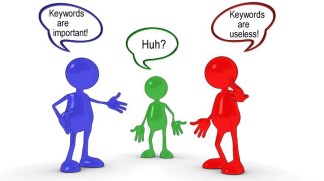 If you have a business website, you’ve undoubtedly heard about keywords and recently you may have heard that keywords don’t really matter. At its most basic, a keyword can be one word or a phrase and has always been used to describe the main topic of a piece of content, usually a web page.
If you have a business website, you’ve undoubtedly heard about keywords and recently you may have heard that keywords don’t really matter. At its most basic, a keyword can be one word or a phrase and has always been used to describe the main topic of a piece of content, usually a web page.
Once upon a time in web history, people used keywords in the code on each web page to indicate to the search engines what that page was about. The original intent was innocent enough, but that bit of code (called a keyword meta tag) was soon being misused to trick the search engines into sending traffic to websites. As with most spammy tactics, it worked great for a while. People were including keywords in their meta tags and hiding them on pages that had no connection to each other, but they were popular words people were searching for (like Viagra, and Britney Spears).
This abuse of the keyword meta tag led us to today, where that meta tag has been so devalued by spamming that the search engines no longer give it any weight or credibility. Thus you’ll hear people saying that keywords have no value.
But that’s not an accurate statement.
If you look at the keyword as it was originally intended, to be a defining term that indicates what a web page is about, it has a place in your website strategy. The keyword meta tag has become irrelevant, but not keywords themselves.
Keywords and Search Engine Strategy
A web page that has one central topic and contains text, images and links that are all closely associated with that topic is going to be recognized by the search engines. The more unique content related to your keyword that you put on that page, the better. Focus the topic on each page of your website using a keyword or keyword phrase as your guide. Not only does that help people reading it, but it makes it crystal clear to the search engines.
Which keyword(s) to use? Use the ones that people are searching on to find a business like yours. This is the part that takes a bit of time and effort, but here are some tips on deciding which keywords you should be using to focus your website content.
Do Some Research
Use Google’s free keyword research tool to find search terms that people are typing in to find businesses like yours. Don’t use jargon that your customers may not be familiar with or keywords that have millions of search results. The more specific you are, the better. The AdWords tool will show you related keywords and phrases along with the volume of monthly searches for each one.
Narrow Your Focus
Zero in on the longtail keywords. What does that mean? A longtail keyword is a multi-word phrase with a really specific search term like “laptop virus cleanup grapevine tx”. The benefit of a longtail keyword phrase is twofold; a consumer who types that phrase into a search is probably ready to buy/hire a specific product or service, and it’s likely that there is less competition for a detailed phrase like that than for a broader keyword.
A broad keyword is one like “computer service”. Chances are that there is a lot of competition for a keyword like that. And chances are that if you’re a smaller computer repair shop, your business will find it much harder to show up in the top 10 results for “computer service.” The national chains and bigger companies will dominate that.
So it makes sense to find and target the more specific longtail search terms and build pages on your website that are closely tied to those chosen keywords.
Keyword as a PPC Target
If you’re doing any paid online advertising you’ll discover that some keywords are more expensive to bid on than others. There is a lot of competition to rank for “plumber Dallas”, and you’ll have to shell out a lot of money to go for that one. Instead, go for more specific keywords that include a service and a more specific geo area, like “repair outdoor faucet grapevine tx”. There will be far fewer searches per month on a phrase that specific, but it will cost less, have less competition, and will probably represent a consumer who needs to hire someone right away.
The same advice applies to your PPC landing pages as it does to any page on your website. Make sure the content and the on-page elements are all closely related to the keyword you’re targeting. Every page on your website is actually a “landing page” for a particular keyword or keyword phrase, whether it’s in support of your PPC efforts, or it’s part of your organic strategy.




